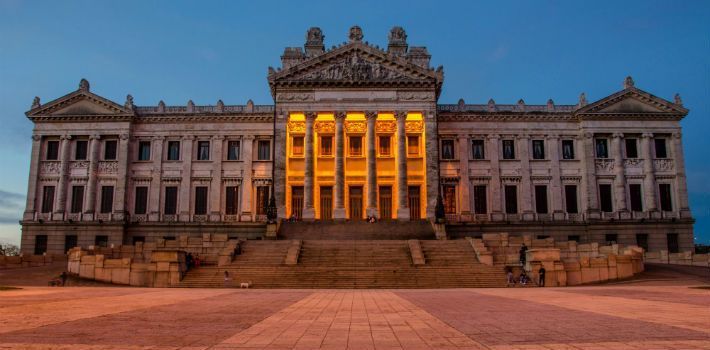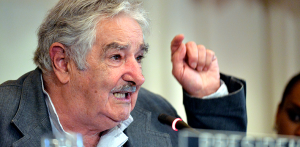
EspañolOn Wednesday, December 16, a full session of the Uruguayan Senate passed a new Media Law which will regulate all television and radio services in the country. Legislators from governing coalition the Broad Front (FA), which enjoys a parliamentary majority, aim to pass the initiative prior to Christmas. The measure is set to enter the Chamber of Deputies on Monday, December 22.
The initiative, written by Uruguay’s Industry Ministry, contains among its 180 articles provisions affecting the three Uruguayan broadcasters which currently hold the most broadcasting time.
“Broadcasters can compete to win transmission slots on the cable network without having to pay anything. This is done with the objective of enriching the broadcast schedule and favoring national production,” said FA senator Enrique Rubio.
Tabaré Vázquez, due to assume the presidency on March 1, argued that the project couldn’t be delayed any further after the intermission for elections that had followed its first proposal in May 2013. Vázquez added that the FA under his leadership would seek to make a “qualitative leap” in cultural policies.
“We’ll consolidate these achievements and create new realities, because culture belongs to all society. Culture also transforms society with new creations, innovations, and with the input of new generations. It’s imperative to continue supporting culture in all its manifestations,” added the president-elect, who also governed between 2005 and 2010.
Vázquez argued that the Media Law was designed to “protect and promote greater equality of opportunity” in Uruguayan cultural production.
Law “Won’t Gag” Press Freedom

The initiative was backed by the Coalition for Democratic Communication, a collective comprised of 30 organizations and unions, which were present at the debate.
“The current Law of Radio Broadcasting was imposed by the dictatorship [1973-1985], so the moment for a law passed under democracy is now,” said an official statement from the NGO.
“The new law facilitates greater citizen participation in the creation of the opinions and content of broadcast media. Everyone has the right to communication, to give and receive information and ideas and opinions, and to seek them out and to spread them,” the briefing continued.
In an interview with Ocean FM, current Uruguayan President José Mujica expressed his opposition to foreign groups owning local media. “I don’t want Clarín, Globo or [Carlos] Slim to become media owners in Uruguay.”
“Some people think that to regulate anything is a mortal sin,” Mujica continued, “But I think exactly the reverse. If we don’t regulate here, these foreign sharks, these privileged families, will end up devouring us … we need freedom of the press, we don’t need a monopoly,” he said, in reference to international media conglomerates.
Finally, Mujica said that the project was “far from a gag on journalists, broadcast media, and editorial lines,” arguing that guaranteed citizens’ rights and was developed with the support of the Inter-American Commission of Human Rights and the UN special rapporteur responsible for freedom of expression.
The Law in Detail
Articles 51 and 54 of the Audiovisual Communication Services Law deal with regulation over complete or partial ownership by physical or legal persons. It states that monopolies, and the concentration of broadcast media into a few hands, damage the democratic system by not permitting a plurality of voices to be heard.
In the same way, it prohibits cable companies from supplying more than 25 percent of the total number of homes with television access in the country.
Furthermore, 60 percent of the content transmitted on television, be it through open signal or by cable, must be produced or co-produced within the country. Added to this requirement, 30 percent of national television output has to be created by independent producers, but no individual broadcaster can produce more than 40 percent of programming for one media outlet (Article 51). Radio music shows are required to broadcast a minimum of 30 percent Uruguayan music out of the their total programming (Article 52).
Among the other measures, Article 34 of the law prohibits advertisements related to the sale of alcoholic drinks, the tobacco industry, or any other product harmful to health.
The Media Law also establishes an Audiovisual Communication Council in charge of enforcing the law, and of licensing and authorization. The entity will be composed of five members, all appointed by the executive, but three of them, including the body’s president, will require approval by two-thirds of the Senate.
The law also establishes sanctions of up to US$1.5 million for failure to comply with its provisions, and establishes licenses as lasting for 10 years for radio broadcasters and 15 for television.
Opposition Voices
Pablo Mieres, president of the Independent Party (PI) argued that the law “opens a door” for political control of media content. Mieres said that the law could have been avoided through the creation of another which dealt only with frequencies and licensing.
Ley de medios: PI dispuesto a presentar inconstitucionalidad http://t.co/lLFOXLEW2W vía @ObservadorUY
— Pablo Mieres (@Pablo_Mieres) December 15, 2014
Meanwhile, Álvaro Delgado of the National Party (PN) described the law as “ridiculously detailed” and “very difficult to comply with.”
 Versión Español
Versión Español












